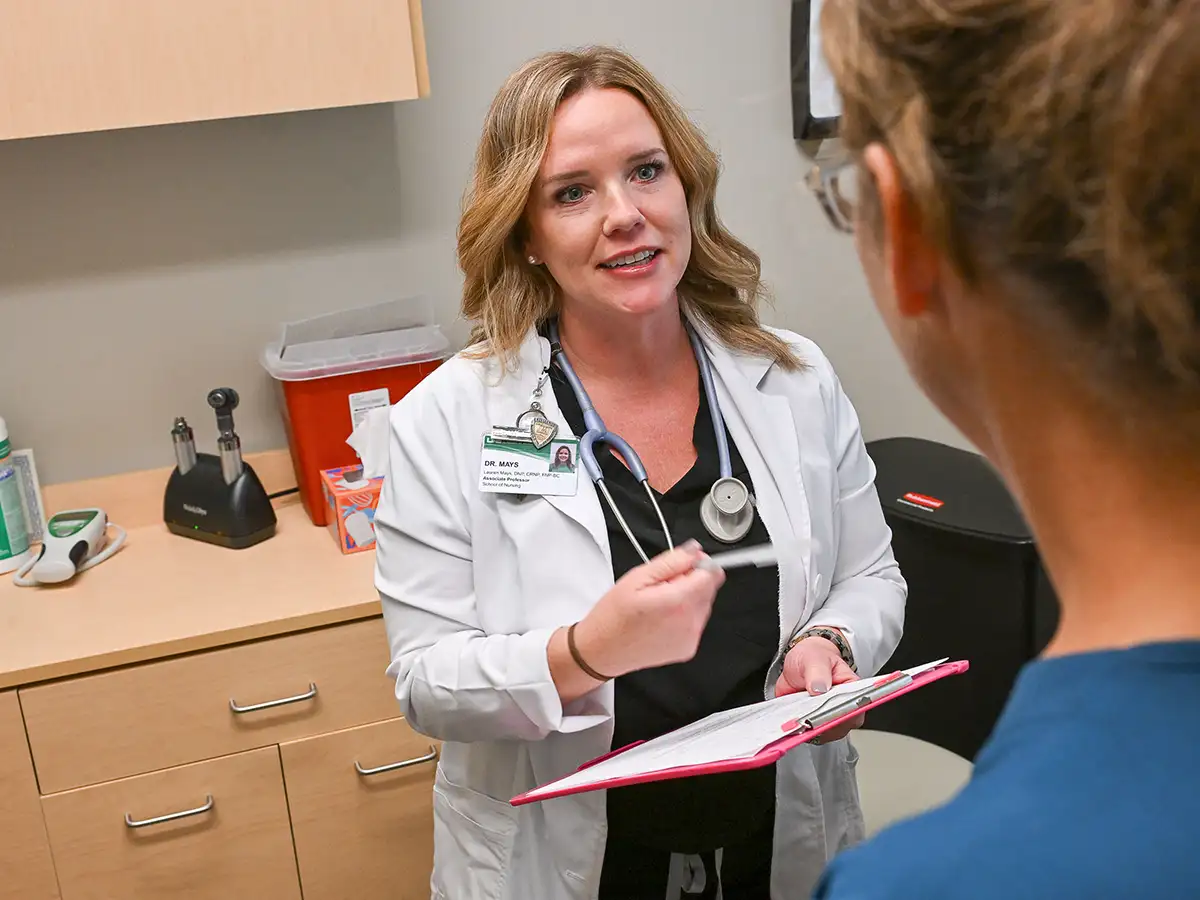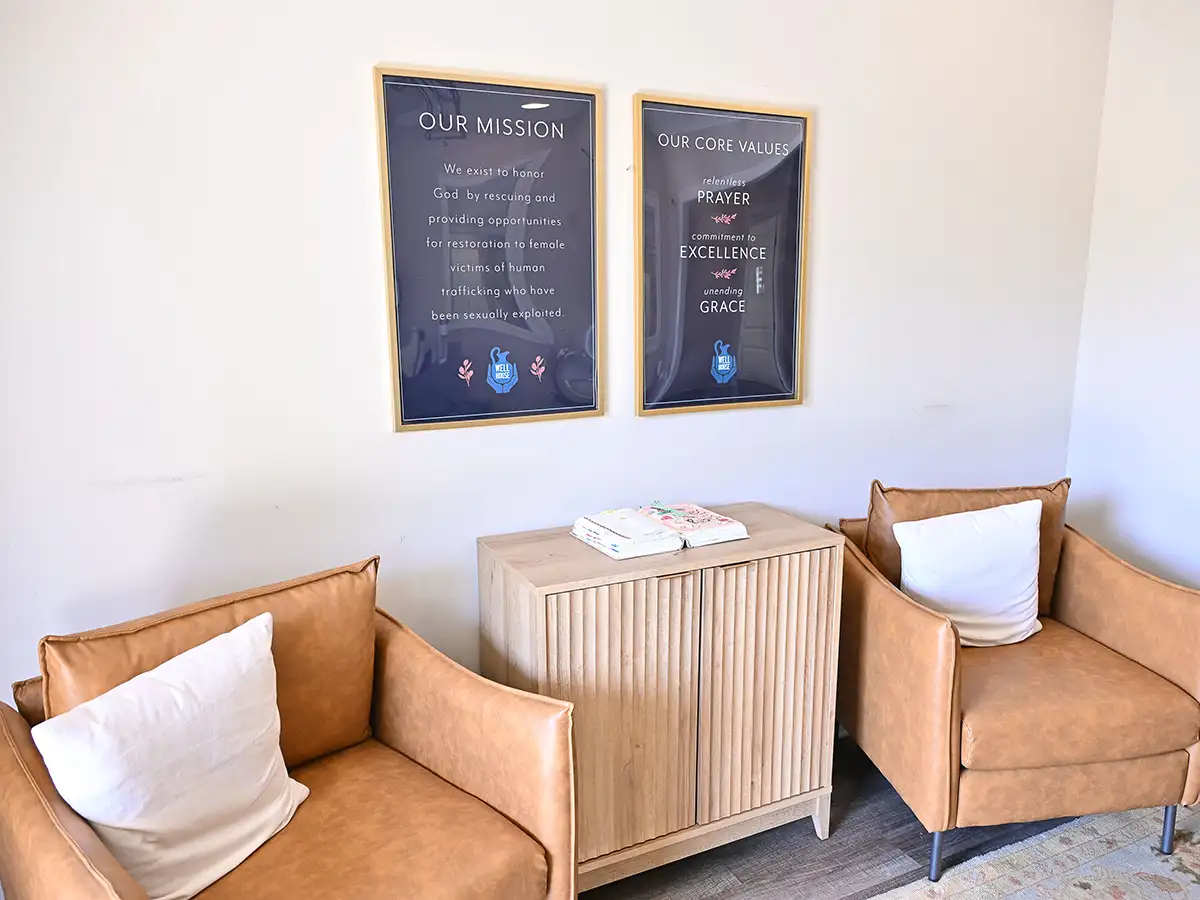The UAB School of Nursing is an established leader in education, practice and policy related to trauma and trauma-informed care. Since 2016, the School has combined the nursing, forensic, and legal sciences to bring safety, medical treatment, and justice to patients who have suffered various forms of trauma through its education, practice, and research programs. It now leads a multidisciplinary partnership addressing issues such as human trafficking, intimate partner violence, domestic violence, sexual exploitation, and trauma-informed care.
The partnership was spearheaded by Dr. Ashley Hodges, who is nationally recognized for her work in trauma-informed care with victims of violence. Following her retirement, Dr. Lauren Mays has assumed leadership of the clinic and continues to advance this mission. Dr. Mays’ practice incorporates innovative quality improvement initiatives, translating evidence into practice in alignment with the UAB School of Nursing’s research and scholarship mission.
Trauma-Informed Care
An individual’s trauma experience impacts every part of their life – physical, mental and behavioral health as well as social interactions. Trauma-informed care emphasizes physical, psychological, and emotional safety, and creates opportunities for survivors to rebuild a sense of control and empowerment.
At the UAB School of Nursing, trauma-informed care involves:
- Recognizing and responding to the effects of trauma.
- Delivering multidisciplinary care that avoids retraumatization.
- Supporting patients in actively participating in their care.
Dr. Mays has implemented standardized screening tools to assess and address anxiety, depression, and sleep quality. Data from her practice demonstrates improved outcomes across these areas. Under her trauma-informed approach, patients are empowered to resume normal life activities and gradually assume self-care strategies.
Human Trafficking
Human sex trafficking is the recruitment, harboring, transportation, provision, or obtaining of a person for a commercial sex act, induced by force, fraud, or coercion. While its prevalence is underestimated due to the hidden nature of the crime, it affects individuals of all genders, ages, races, and ethnicities across the United States.
Healthcare providers are often the only professionals an individual encounters during exploitation. Studies show that up to 88% of trafficked persons interact with health care providers while still being trafficked, yet most are not identified at the time. A lack of training contributes to missed opportunities for intervention.
To address the gap, Dr. Mays earned a Train the Trainer certification to enhance education across disciplines on caring for individuals who have been trafficked. To date, she has trained over 600 healthcare professionals across disciplines – globally – on delivering trauma-informed, equity-centered care.
Intimate Partner Violence
Intimate partner violence (IPV) and domestic violence include physical violence, sexual violence, stalking, or psychological harm by a current or former partner or spouse. It crosses all demographics and contexts.
- Approximately 41% of female survivors and 14% of male survivors sustain physical injuries.
- One in six murder victims in the U.S. are killed by an intimate partner.
- More than 40% of female homicides are attributable to intimate partner violence.
Healthcare providers play a critical role in identifying, supporting, and caring for individuals affected by IPV. The UAB School of Nursing’s trauma-informed approach ensures that survivors’ immediate and long-term medical and psychological needs are addressed with dignity and respect.
The WellHouse Clinic

In 2018, The WellHouse and UAB School of Nursing partnered to launch the nation’s first primary care clinic located inside a residential facility for human trafficking survivors over the age of 17.
Originally led by Dr. Ashley Hodges, the clinic is now directed by Dr. Lauren Mays, nurse practitioner and forensic nurse educator. The clinic provides free, on-site, evidence-based, trauma-informed primary and women’s health care, integrated with behavioral health.
Dr. Mays has established a health maintenance dashboard to track quality metrics, ensuring that every patient receives evidence-based preventive screenings and care. Since implementing the dashboard:
- 100% of patients have achieved an up-to-date plan for cancer screenings, immunizations, and mental health screenings.
- >95% of residents are up-to-date with all screenings based on age, gender, and risk factors.
She has also improved clinic efficiency by introducing pre-completed intake paperwork and triaging patient concerns, reducing delays and enhancing the patient experience.
An Impactful Partnership
The WellHouse–UAB School of Nursing Clinic has become a model of evidence-based, trauma-informed care for trafficking survivors. Dr. Mays has:
- Served as Expert Consultant on two foundation grants in 2024 totaling $61,000 to support patient healthcare needs.
- Shared knowledge through local, state, national, and international presentations, publications, and leadership roles in professional organizations.
- Written the first book chapter on human trafficking for a primary care textbook for advanced practice providers (Springer Publishing, 2026).
Her scholarship and practice reflect a deep commitment to advancing care for victims of interpersonal violence, while training the next generation of providers to recognize and respond effectively.
The Ripple Effect

Through her leadership at The WellHouse, Dr. Mays is translating patient feedback and outcomes into innovative practices that are improving care. She continues to:
- Develop, implement, and evaluate standards of care for survivors.
- Contribute to national curriculum development and simulation training for NP students.
- Review journal manuscripts, providing expertise on the intersection of human trafficking and health.
Her work not only transforms the lives of WellHouse residents but also contributes to a broader movement advocating for trauma-informed care in healthcare and education nationwide.
Outcomes (as of May 31, 2025):
- 424 unique patients served, ages 18–58.
- Nearly 4,000 patient visits.
- Improved outcomes in anxiety, depression, and sleep quality.
- 100% compliance with evidence-based preventive care screenings.
- Positive patient experience scores, with ongoing quality improvement measures in place.
